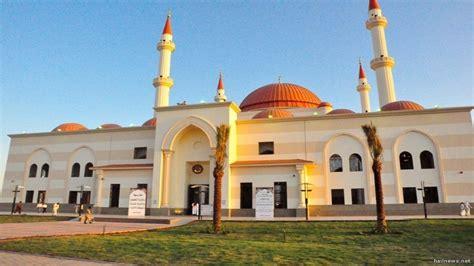Looks in the mosques: Saudi Arabia organizes its use and tweets responds #We demand that you prevent the sound of music
The decision of the Saudi authorities to organize and determine the use of loudspeakers in the mosques a great controversy, and the Saudis were divided between welcome and angry.
Times of using amplifiers
The controversy began with a decision of the Minister of Islamic Affairs Abd al -Latif Al -Sheikh in the palace of the use of external loudspeakers for mosques to raise the call to prayer and residence only, "and that the level of the high volume in the devices does not exceed a third of the degree of the loudspeaker, and the regular action is taken against those who disagree.".
The decision was issued on Sunday, and the Saudis began social media users to interact with him and express their position on it.
The tweeters inaugurated the beginning of the tag #loudspeakers and through him were divided into a welcome decision and an angry opposition to him.
"The amplifiers cause confusion and harm"
As for the supporters, many of them published what they say is a message that was sent thirty -four years ago from Abdulaziz bin Baz, the general president of the departments of scientific research, advisory, advocacy and guidance at the time, to the Director General of Endowments and Mosques requesting a circular to the imamsThe ears, prayer, and when speeches in the sermons on the feast, for example.
تخطى مواضيع قد تهمك وواصل القراءةمواضيع قد تهمكTopics that may interest you end

The document, which we do not know how valid it is, stated that the use of amplifiers externally at other times has a disturbance of mosques because of their proximity to each other.
Among the opinions also supporting the definition of the use of loudspeakers, which were circulated by the tweeters, which was attributed to the member of the Senior Scholars Authority and a member of the permanent committee of the fatwa, Saleh Al -Fawzan, who said that "in raising the sound through the amplifiers for those outside the mosques in it is harm to the homes and the patients and those who pray in their homes.".
Those who have not seen an objection to the application of this decision said that the use of amplifiers "is neither an obligation nor a religious corner, nor is it from the Sunnah of the Prophet", surprisingly, the anger of those who reject it.
#We demand the prevention of the sound of the musician
On the other hand, the decision disturbed many and angered them because of the "considering the voice of recitation of the Qur’an as a disturbance".
And the angry and my name inaugurated #We demand that you prevent the sound of the musician.
They believe that, in order to follow the same logic, because of the transmission of the recitation of the Qur’an in loudspeakers outside the mosques at the time of prayer, it is also necessary to prevent the broadcast of music and songs in public places.
For them, if "the voice of the Qur’an through the amplifiers is harmful and inconvenient" for some people, then in singing and music in cafes, restaurants and public places is inconvenience for those who do not want to hear it and whoever considers this forbidden and whoever leaves his home to those places "in order to calm down".
Some touched on a religious scale about "hearing songs during food", so some considered it a forbidden, and some considered it a "extraneous" and "provocation to Muslims".
The response of some to this came that "whoever goes to restaurants and cafes can choose a suitable place for him and what he loves" while "there is no choice for whom the voices of the mosques are spoiled while he is in his home".
Then the controversy came out of the scope of "Voice of the Qur’an or the Voice of Music in the Public Space" to a controversy over "prohibiting music and music".
And the "Fatwas" tweeters deprived of music and singing, and others published "Fatwas" an interview with which it is permissible.
It is noteworthy that the decision to determine the use of loudspeakers in mosques does not apply to the Two Holy Mosques, which are managed independently under the management of the Two Holy Mosques..
Home news
we choose for you
More
BBC News, عربي© 2022 BBC.BBC is not responsible for the content of external sites.Our policy regarding external links.










